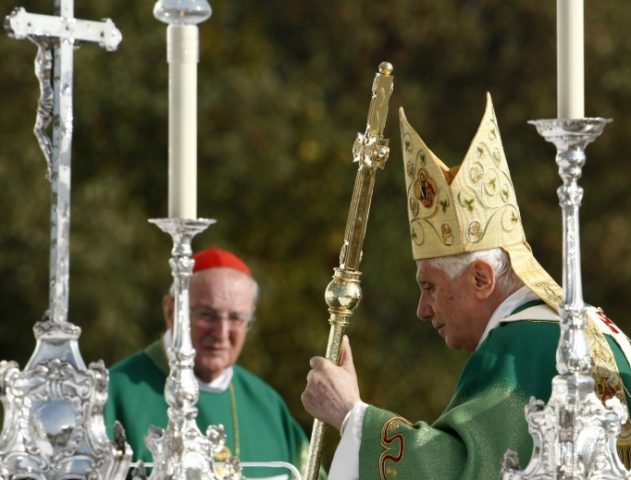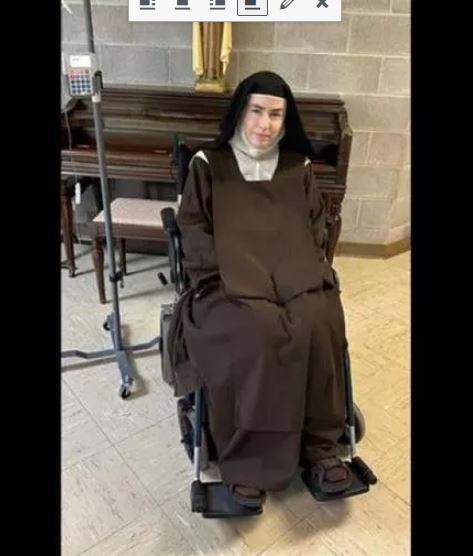COMMENTARY: The pope emeritus’ July 11 message reminded all listeners why Benedict XVI remains without literary peer among Catholic preachers and theologians.
By Father Raymond J. de Souza, National Catholic Register, 7/19/17
There was a surprise at the funeral Mass of Cardinal Joachim Meisner on July 15 in Cologne; a message was read from Pope Emeritus Benedict XVI, dated July 11. The message was not as explosive as some commentators with short memories made it out to be; it was vintage Ratzinger, always alert to the precarious state of the Church.
The message reminded all listeners why Benedict remains without literary peer among Catholic preachers and theologians; in just 650 words (in the English translation), he summarized the arc of a great Churchman’s life in light of the signs of the times. In an ecclesial environment of increasingly strident language, Benedict’s characteristically serene and luminous intervention was a gift to the memory of his great friend.
The mellifluous message was significant in seven ways.
A Capsizing Church
The image that garnered the most attention, accompanied by inflamed headlines in some quarters of the Catholic media, was Benedict’s depiction of a beleaguered Church:
This passionate shepherd and pastor found it difficult to leave his post, especially at a time in which the Church stands in particularly pressing need of convincing shepherds who can resist the dictatorship of the spirit of the age and who live and think the faith with determination. However, what moved me all the more was that, in this last period of his life, he learned to let go and to live out of a deep conviction that the Lord does not abandon his Church, even if the boat has taken on so much water as to be on the verge of capsizing.
That ought not be interpreted as though Benedict thinks the Church is floundering under Pope Francis. There is no basis for that in any public record. Dutifully enough, Benedict’s secretary, Archbishop Georg Gänswein — who read the message at the funeral — clarified that, of course, Benedict’s remarks were not directed at Pope Francis.
The image of the boat taking on water is a favorite of Benedict’s. At the Mass before the conclave in 2005, when he preached against the “dictatorship of relativism” — to which he returned in Cardinal Meisner’s funeral message — he spoke also of stormy waters:
How many winds of doctrine have we known in recent decades, how many ideological currents, how many ways of thinking. The small boat of the thought of many Christians has often been tossed about by these waves — flung from one extreme to another: from Marxism to liberalism, even to libertinism; from collectivism to radical individualism; from atheism to a vague religious mysticism; from agnosticism to syncretism and so forth.
And in his last general audience before his abdication, on Feb. 27, 2013, he returned again to the biblical image of the Church as a boat in danger of sinking:
I have felt like St. Peter with the apostles in the boat on the Sea of Galilee: The Lord has given us so many days of sun and of light winds, days when the catch was abundant; there were also moments when the waters were rough and the winds against us, as throughout the Church’s history, and the Lord seemed to be sleeping. But I have always known that the Lord is in that boat, and I have always known that the barque of the Church is not mine, but his. Nor does the Lord let it sink; it is he who guides it, surely also through those whom he has chosen, because he so wished. This has been, and is, a certainty which nothing can shake.
For long decades, Ratzinger/Benedict has considered the state of the Church — especially in his native Germany — to be in dire shape. His message for Cardinal Meisner’s obsequies could not refrain from returning to that theme, as the two of them spent most of their life together in a boat that was taking on water. Nothing more need be read into Benedict’s image than that.
Brothers in Battle: Ratzinger and Meisner
Cardinal Meisner was Benedict’s best friend in the German hierarchy; they had spoken by phone the day before he died. Meisner himself revealed that, during the conclave of 2005, he fought “like I have never fought before” to see Joseph Ratzinger elected.
After his election, it was reported that Cardinal Meisner still called Benedict “Joseph” in private. Meisner was the one who went to Benedict asking that he sack his secretary of state, Cardinal Tarcisio Bertone, as he was not being served well. Benedict refused, but that Cardinal Meisner could ask indicated his closeness to the Holy Father.
Together, Meisner and Ratzinger were the two great pillars of Catholic orthodoxy in a turbulent time for the Church in Germany. Ratzinger became archbishop of Munich in 1977, and then came to Rome as prefect of doctrine in 1981. Meisner was made an auxiliary bishop of Erfurt-Meiningen, a diocese in East Germany, in 1975. In 1980 he became bishop of a still-divided Berlin, and in 1988, he was named archbishop of Cologne, Germany’s premier diocese. He held that post for 25 years, until he retired at 80 in 2014.
The Church in Germany has an outsize influence in global Catholicism, due to the level of its scholarship, its well-developed institutions and its vast sums of money. It was critical to the life of the Church universal that Ratzinger and Meisner brought that influence to bear partly for good over the last 40 years. Their friendship was forged in many battles fought together.
A Life Fraught With History
Benedict began his message:
We had spoken on the telephone to one another just the day before. Gratefulness for finally being able to begin his vacation, after having participated in the beatification ceremony of Bishop Teofilius Matulionis in Vilnius on the previous Sunday (June 25), was audible in his voice. Love for the Churches in the neighboring countries to the East, which suffered under communist persecution, as well as an appreciation for their holding fast amidst the suffering of those times, made a lifelong impression upon him. And, thus, it is no coincidence that the last visitation of his life was paid in respect to a “Confessor of the Faith” from those lands.
Joachim Meisner was born on Christmas Day 1933 in Breslau, Germany. When he was born, Berlin was only three years old as a diocese, having been carved out of the Diocese of Breslau. After the war, Breslau became Wrocław, Poland, and the Meisner family shifted west as the map of Germany shifted west.
He grew up under communism and became a bishop in a German Church divided between west and east, free and persecuted; he lived that division daily when he became bishop of Berlin in 1980. Upon his transfer to Germany’s most important see in 1988, he witnessed the unification of Berlin and of Germany.
In his life of nearly 84 years, Meisner lived under the Third Reich, Soviet domination, a divided Germany and a free and united Europe. His solidarity with the enslaved Churches under communism was borne of experience. He, along with Ratzinger, belongs to the last generation of those pastors who witnessed the drama of totalitarian atheism in Europe.
Eucharist and Confession
The consolations of old men who have seen much and endured much are worth noting. Benedict did just that:
Of late, two things caused [Cardinal Meisner] to become ever more joyful and confident:
For one, he repeatedly related to me how it filled him with profound delight to see how young people, especially young men, experienced the grace of forgiveness in the sacrament of confession — the gift of having truly found that life which only God can give them.
The other thing which always touched him anew and put him in a joyful mood was the quiet spread of Eucharistic adoration.
The Eucharist and confession are the two sacraments that can be received frequently; they are thus the pillars of a sacramental life, and the sacraments are the lifeblood of the Church. There can be no healthy ecclesial life without confessional practice and Eucharistic devotion. That Cardinal Meisner, after a long pastoral life engaged in various challenges and many temporalities, would be heartened by a renewal of both sacraments meant that he never forgot what the Church exists for, namely “the life that only God can give.”
World Youth Day
The 2005 World Youth Day in Cologne, set before Ratzinger became pope but which was providentially his first foreign trip, brought Benedict and Cardinal Meisner together at global Catholicism’s grandest event. It was observed that Benedict put his own stamp on WYD at Cologne, adding a prolonged period of Eucharistic adoration to the Saturday evening vigil. Benedict now reveals Cardinal Meisner’s key role in that decision:
At World Youth Day in Cologne, this was a central concern of his: that there be adoration — a silence in which only the Lord speaks to the heart. Some experts in pastoral work and liturgy were of the opinion that such silence in contemplation of the Lord could not be achieved with such a large number of people. A few even considered Eucharistic adoration as such to be obsolete, as the Lord desires to be received in the Eucharistic Bread, and not examined. That, however, one cannot eat this Bread like some common nourishment, and that to “receive” the Lord in the Eucharistic sacrament makes demands upon every dimension of our existence — that to receive must be to adore — has since become, once again, very clear.
Thus the interlude of the Eucharistic adoration at the Cologne World Youth Day became an interior event which remained, and not only for the cardinal, unforgettable. This moment remained ever present, like a great light, within him.
One expects that that night remains a great light for Benedict, too, demonstrating again the centrality of World Youth Day in the life of the Church — not only for the young, but their pastors, too.
Benedict Engages
It was noted widely that Cardinal Meisner died as one of the four dubia cardinals. Along with Cardinals Raymond Burke, Carlo Caffarra and Walter Brandmüller, Cardinal Meisner signed his name to formal questions put to Pope Francis challenging the apparent papal interpretation of Amoris Laetitia (The Joy of Love).
Benedict certainly knew that his speech at Cardinal Meisner’s funeral would be interpreted as an act of support for the four cardinals’ initiative. But there is no real doubt about what Benedict thinks on the matter, as his own magisterium is clearly opposed by the very interpretations of Amoris Laetitia the four cardinals were attempting to correct. That he might want to salute the last great act of fidelity of a friend and great Churchman is understandable.
Benedict has clearly taken a decision to engage — quietly but unmistakably — over the past year. His decision to write the foreword to the German edition of Cardinal Robert Sarah’s latest book, Silence, was a recent example, where he gave his endorsement to the liturgical path Cardinal Sarah is following. Both Cardinal Sarah and Cardinal Meisner have been attacked by those who apparently enjoy favor by Pope Francis, so Benedict’s decision to publicly praise them is significant. And if Benedict is doing that publicly, one can quite imagine what he is saying in his private correspondence, in phone calls and to his visitors.
Looking to the Lord
Benedict’s message concluded:
When, on his last morning, Cardinal Meisner didn’t appear for Mass, he was found dead in his room. His breviary had slipped from his hands: He died praying, looking to the Lord, speaking with the Lord. The manner of death which was granted to him shows once again how he lived: looking to the Lord and speaking with the Lord. Therefore, we may with confidence recommend his soul to the benevolence of God.
One of the longest threads in Ratzinger’s thought is the search for God — the search in the natural order, the reasonableness of divine revelation, and the reality that God exists and can be a friend.
Above all, Benedict believes that it is in the liturgy — the Holy Mass and the Divine Office — that we find God, that we can be face-to-face with him, and that we can converse with him and be in communion with him. That is how Cardinal Joachim Meisner died.
It seems that Benedict would like to die the same way as his great friend did, looking toward the Lord.
Father Raymond J. de Souza is editor in chief of Convivium magazine.







